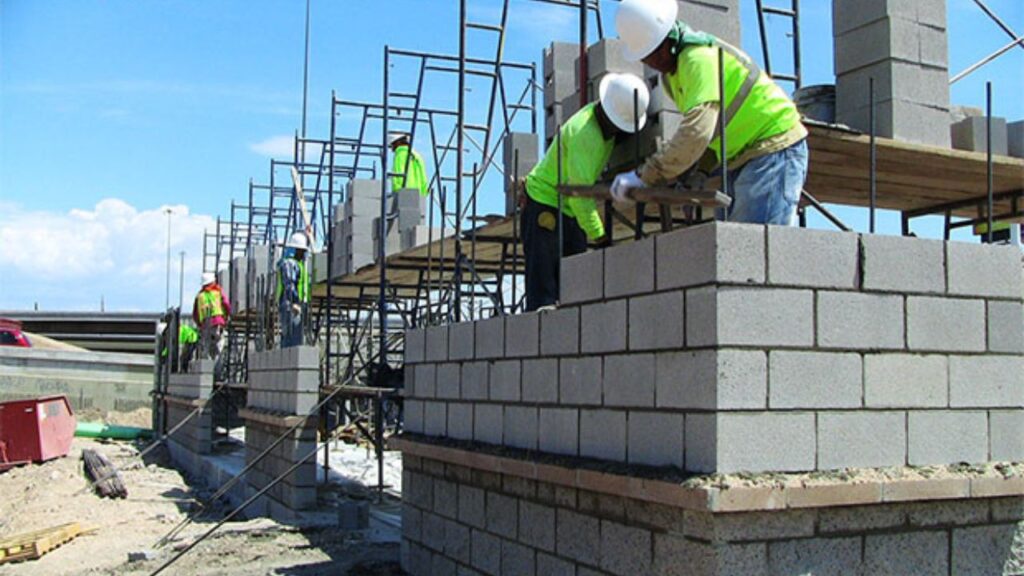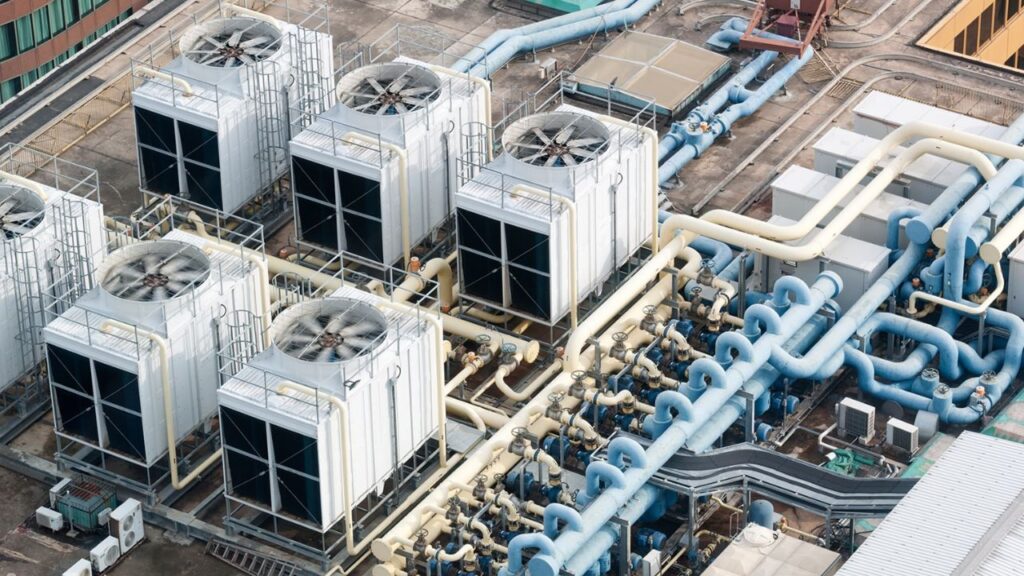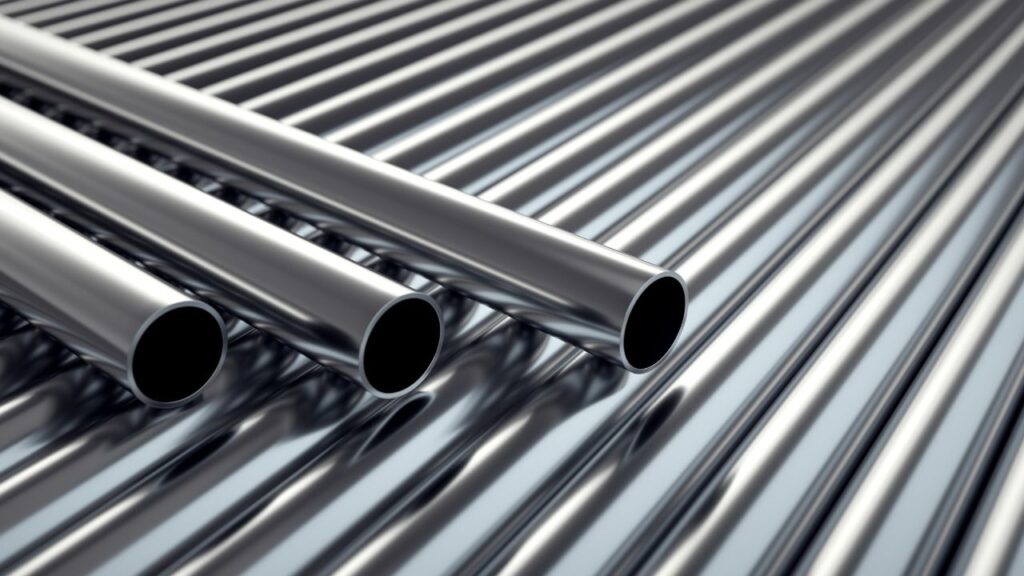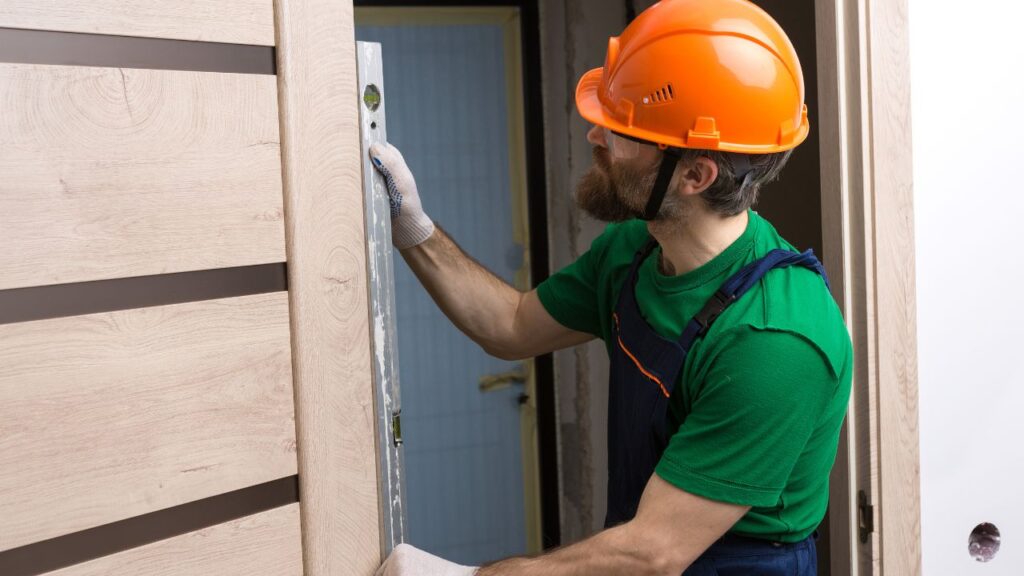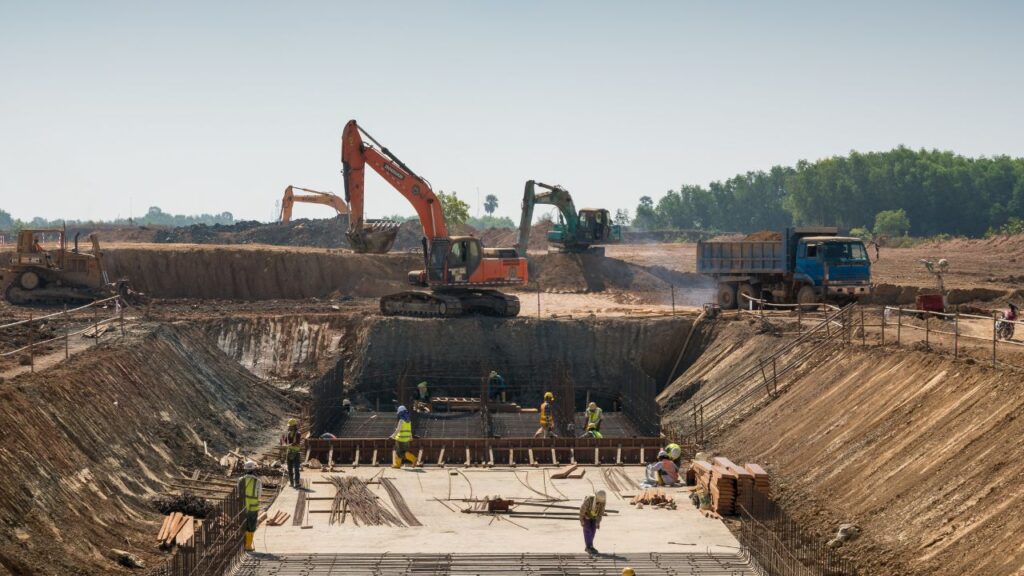Cost per square foot is one of the most common methods for estimating drywall expenses. In Miramar, the average cost to install drywall can range from $1.50 to $3.50 per square foot, including materials and labor. However, more specialized drywall—like fire-rated boards—can push the price higher, while larger projects often benefit from volume discounts. Factors such as finishing level, wall height, and architectural details also affect this figure.
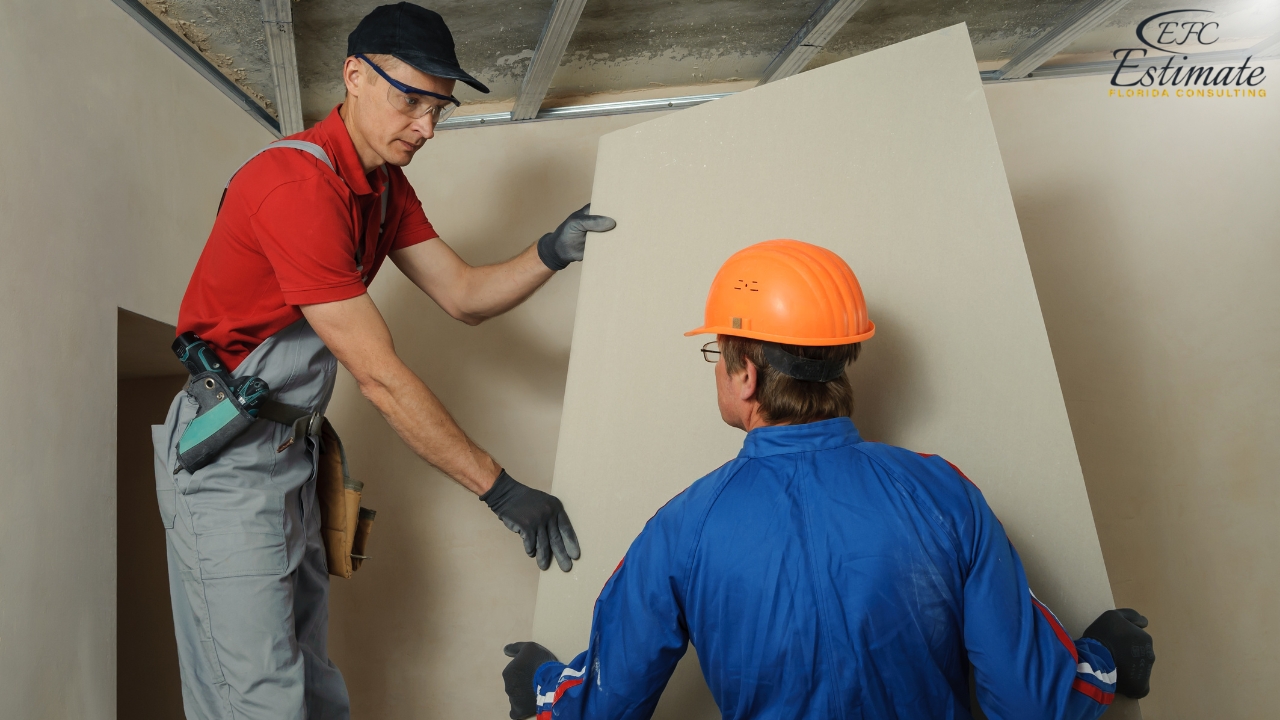
Approximate Drywall Cost per Square Foot in Miramar:
Drywall Type | Cost per Sq. Ft. (Materials + Labor) |
Standard Drywall | $1.50 – $2.00 |
Moisture-Resistant | $2.00 – $2.75 |
Fire-Rated / Type X | $2.50 – $3.00 |
Soundproof / Specialty | $3.00 – $3.50+ |
Drywall Cost by Size in Miramar
The cost of drywall installation depends on several factors, and understanding these can help you plan your budget more effectively. The size and scope of the project play a big role in determining the final price. For instance, installing drywall throughout an entire house is often less expensive per square foot than smaller, individual projects.
Material and installation costs typically range from $3.50 to $8.50 per square foot, depending on the complexity and type of materials used. If you opt for higher-end materials, expect the overall cost to increase. For areas like garages or basements, using unfinished drywall can help reduce expenses without compromising functionality.
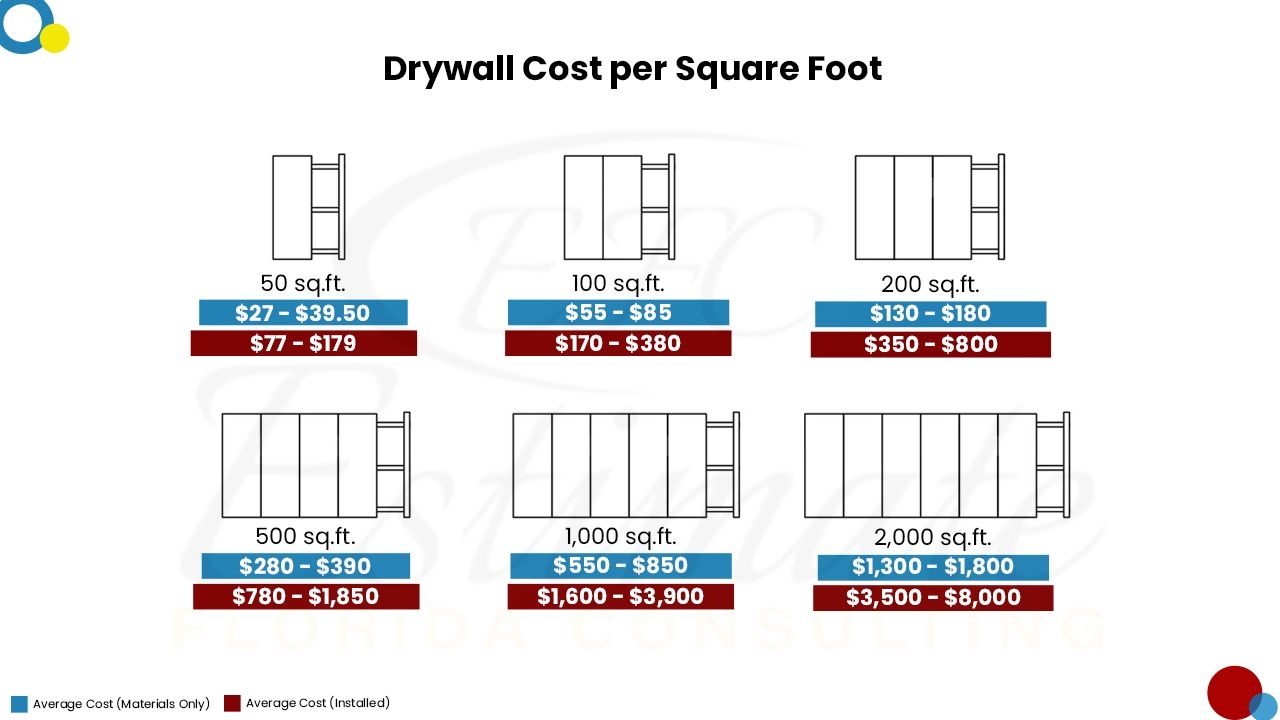
Here’s a guide to average drywall installation costs based on wall and room sizes:
Square Feet | Average Cost (Materials Only) | Average Cost (Installed) |
50 sq.ft. | $27 – $39.50 | $77 – $179 |
100 sq.ft. | $55 – $85 | $170 – $380 |
200 sq.ft. | $130 – $180 | $350 – $800 |
500 sq.ft. | $280 – $390 | $780 – $1,850 |
1,000 sq.ft. | $550 – $850 | $1,600 – $3,900 |
2,000 sq.ft. | $1,300 – $1,800 | $3,500 – $8,000 |
Drywall Installation Cost by Type in Miramar
Drywall comes in several types, each suited for specific needs. Most projects use standard drywall unless a different type is required due to the environment or building codes. For example, moisture-resistant drywall works better in bathrooms or basements, while fire-rated drywall might be necessary in commercial buildings or apartment complexes to meet safety codes. The type you choose depends on your preferences, the room’s purpose, and local building regulations.
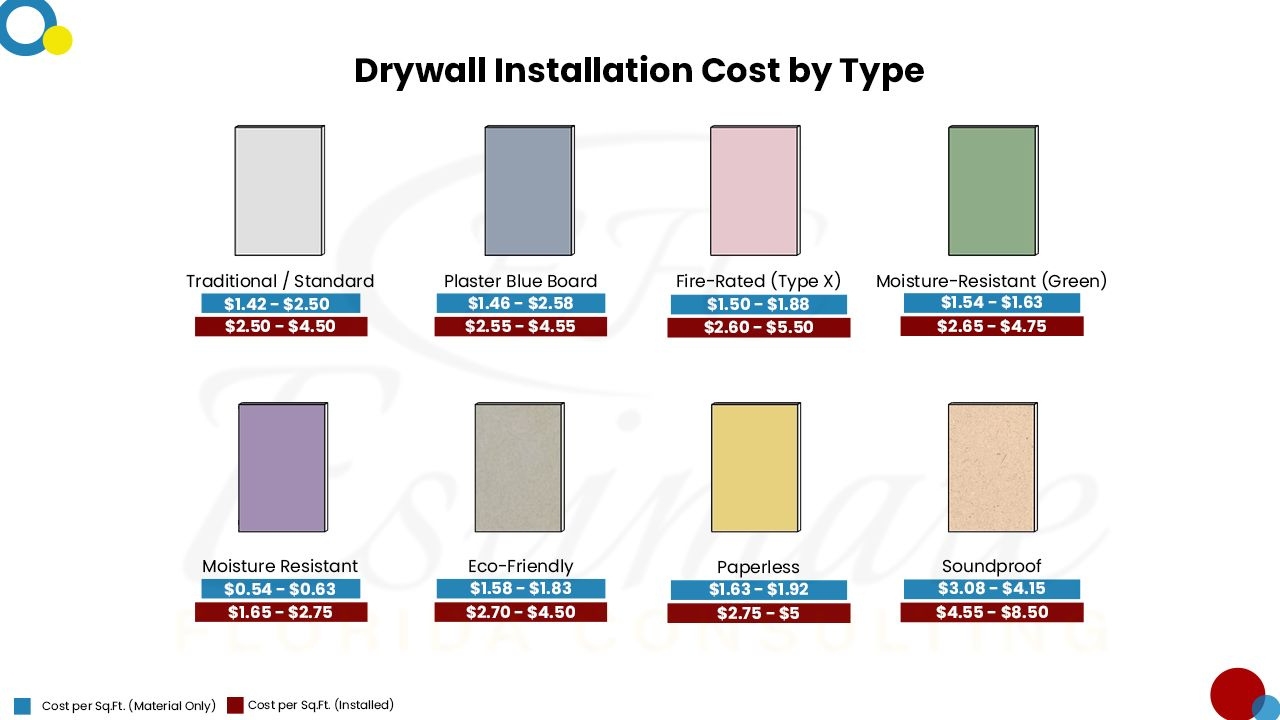
Here’s a breakdown of drywall types and their costs:
Type | Cost per Sq.Ft. (Material Only) | Cost per Sq.Ft. (Installed) |
Traditional / Standard | $1.42 – $2.50 | $2.50 – $2.58 |
Plaster Blue Board | $1.46 – $2.58 | $2.55 – $4.55 |
Fire-Rated (Type X) | $1.50 – $1.88 | $2.60 – $5.50 |
Moisture-Resistant (Green) | $1.54 – $1.63 | $2.65 – $4.75 |
Moisture-and-Mold-Resistant (Purple) | $0.54 – $0.63 | $1.65 – $2.75 |
Eco-Friendly | $1.58 – $1.83 | $2.70 – $4.50 |
Paperless | $1.63 – $1.92 | $2.75 – $5.00 |
Soundproof | $3.08 – $4.15 | $4.55 – $8.50 |
Average Cost to Install a Drywall Ceiling by Size in Miramar
The cost of installing drywall on a ceiling depends on the size of the boards. For materials, prices range from $13 to $35 per board, while installation costs typically fall between $58 and $195 per board. Ceiling drywall installation tends to be more expensive than wall installation because lifting and securing the heavy panels overhead is more labor-intensive and often requires a team of workers, increasing labor costs.
Drywall boards come in a variety of standard sizes, with the most common being 4 feet by 8 feet. Larger options like 4’ x 12’ and 4’ x 16’ are also available. The choice of size depends on the room’s layout and your specific preferences. Below is a table summarizing the costs:
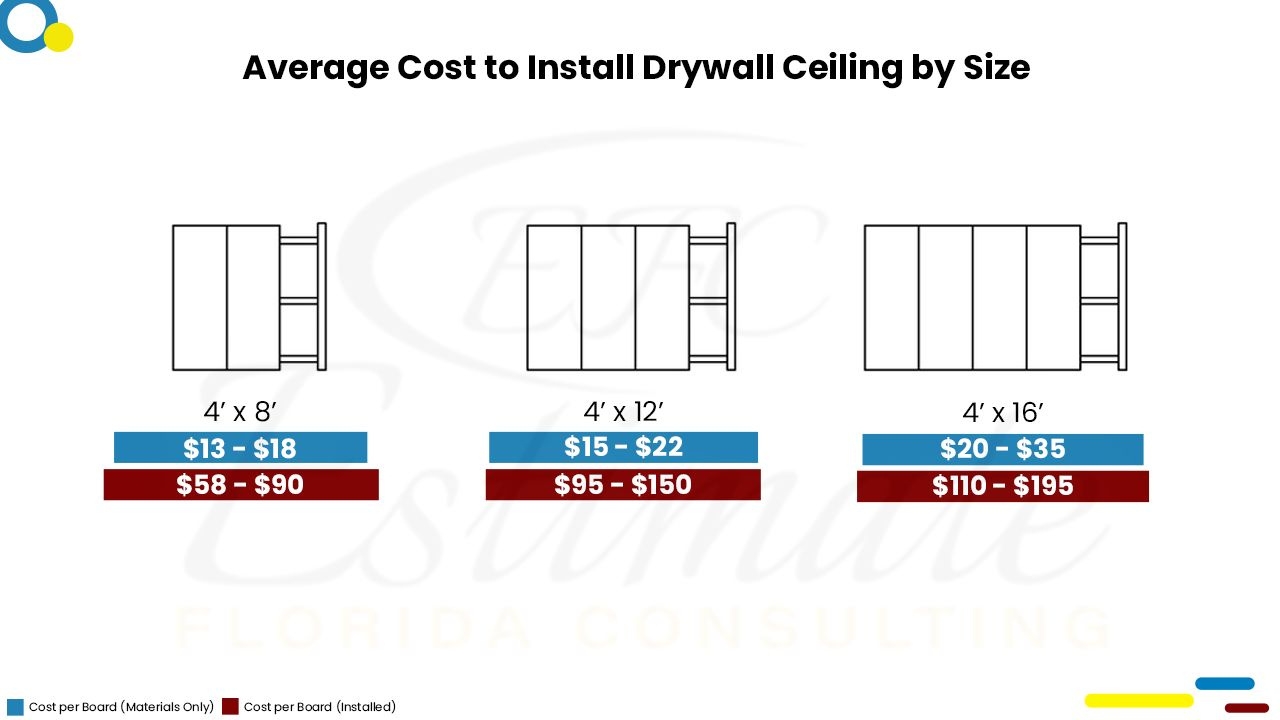
Size | Cost per Board (Materials Only) | Cost per Board (Installed) |
4’ x 8’ | $13 – $18 | $58 – $90 |
4’ x 12’ | $15 – $22 | $95 – $150 |
4’ x 16’ | $20 – $35 | $110 – $195 |
Get Acquainted with Estimation
Maximize Profits: Budgeting Hacks for Big Construction Projects
Construction Cost Estimator | Cost Estimating Service |
Cost to Install a Drywall Ceiling by Room in Miramar
The cost of putting up a drywall ceiling varies depending on factors like the room’s size, the type of drywall needed, and how complex the installation is. Prices range from $70 for a hallway to as much as $6,250 for a basement. The materials and requirements for each room differ. For instance:
- Bedrooms and hallways generally use standard drywall.
- Bathrooms and basements require moisture-resistant or mold-resistant drywall to prevent damage in damp environments.
- If the project involves unique shapes, cuts, or curves, additional charges may apply.
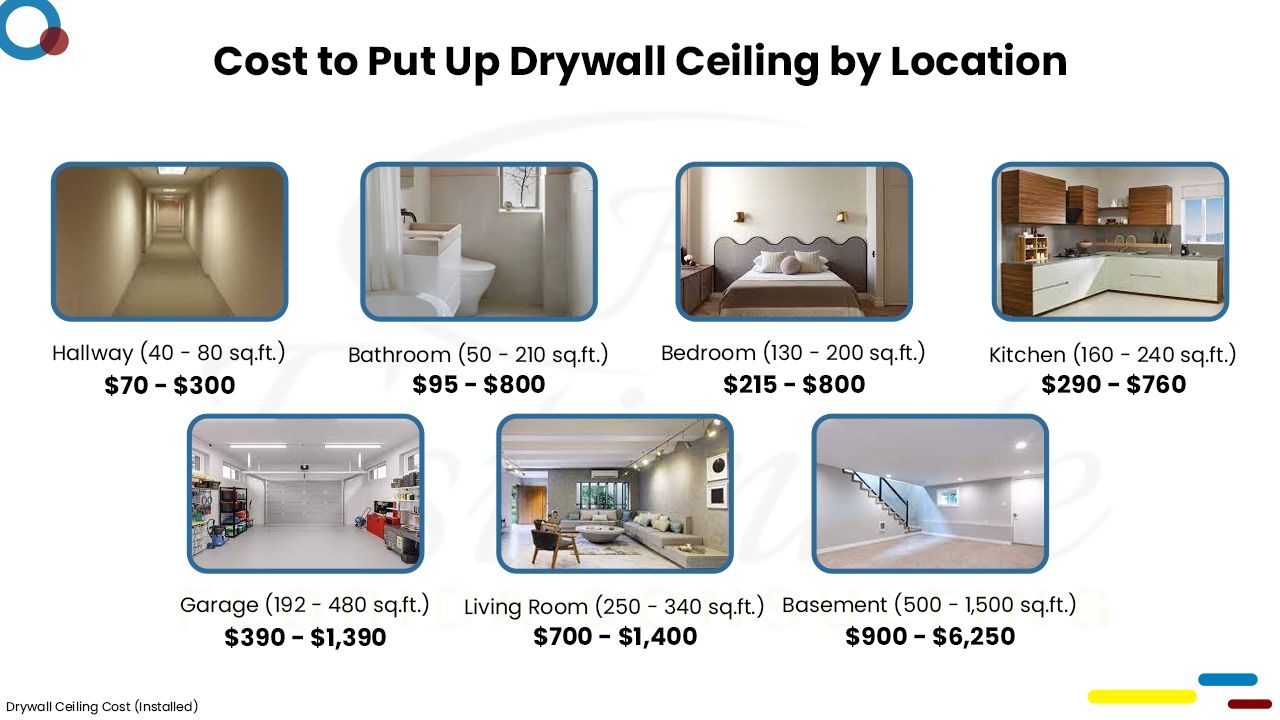
Below is an estimate of drywall ceiling installation costs for various areas:
Room | Drywall Ceiling Cost (Installed) |
Hallway (40–80 sq.ft.) | $70 – $300 |
Bathroom (50–210 sq.ft.) | $95 – $800 |
Bedroom (130–200 sq.ft.) | $215 – $800 |
Kitchen (160–240 sq.ft.) | $290 – $760 |
Garage (192–480 sq.ft.) | $390 – $1,390 |
Living Room (250–340 sq.ft.) | $700 – $1,400 |
Basement (500–1,500 sq.ft.) | $900 – $6,250 |
Drywall Repair Cost per Square Foot in Miramar
Repairing drywall can sometimes be tricky, and the costs can vary depending on several factors. The pricing method often depends on the size of the repair project. For larger areas or multiple rooms, contractors typically charge by the hour. On the other hand, smaller jobs—like fixing holes or cracks in a single wall—are more commonly priced based on square footage.
For instance, contractors may use hourly rates for repairing multiple small cracks throughout the house or replacing large damaged sections. However, when the damage is limited to one wall, square footage pricing is more common. On average, you can expect drywall repair costs to range between $65 and $90 per square foot, but this can vary depending on the specific details of the project.
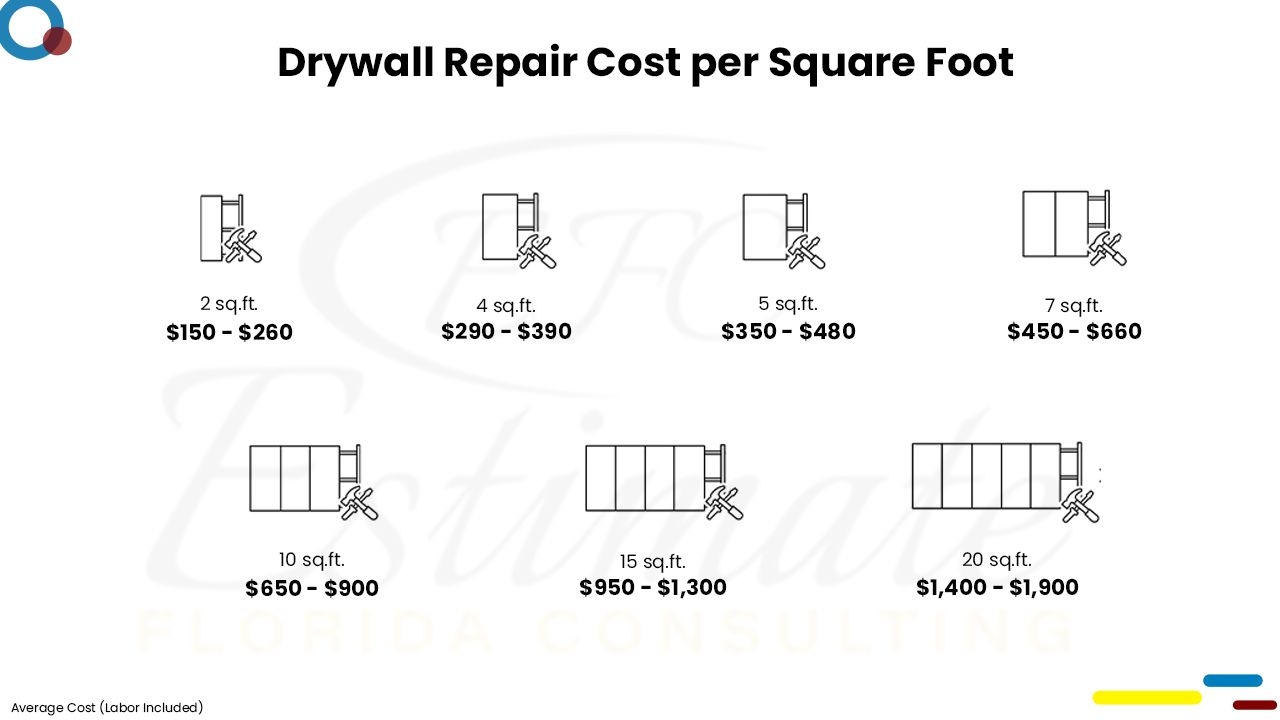
Here’s a breakdown of estimated repair costs, including labor, based on the size of the area:
Size | Average Cost (Labor Included) |
2 sq.ft. | $150 – $260 |
4 sq.ft. | $290 – $390 |
5 sq.ft. | $350 – $480 |
7 sq.ft. | $450 – $660 |
10 sq.ft. | $650 – $900 |
15 sq.ft. | $950 – $1,300 |
20 sq.ft. | $1,400 – $1,900 |
Win More Projects With Us
Repair vs. Replace Drywall
Deciding whether to repair or replace drywall depends on the extent of the damage. Minor issues, like small nail holes or hairline cracks, are easy and inexpensive to fix with simple patchwork. Even moderate holes can usually be repaired without needing to remove the entire drywall panel.
However, if the drywall is heavily damaged—such as large holes, structural issues, or water damage—it’s often better to replace the affected sections. This allows you to address potential problems behind the wall, like mold or rot, and ensures the wall remains strong and secure. In cases of very old drywall, the material may have become brittle over time, making repair impractical. In such situations, removing and replacing the damaged section is the best option.
Here’s a quick comparison of average costs:
Project | Average Costs (Labor Included) |
Repair | $300 – $600 |
Replacement | $500 – $900 |
Drywall for Multi-Story Construction
Drywall in 2-Story Buildings
In two-story buildings, standard 1/2-inch drywall is typically used for both walls and ceilings. Costs range between $1.60 and $2.20 per square foot, depending on the structure’s layout and specific needs. Features like stairwells, vaulted ceilings, and architectural designs often require additional labor and equipment, such as scaffolding, which can increase overall expenses. Builders also need to factor in finishing levels for seamless, polished interiors.
Drywall in 3-Story Buildings
Three-story buildings add logistical challenges due to their height, requiring scaffolding, lifts, and skilled labor for installation. These complexities increase costs to $1.80–$2.40 per square foot. Extra attention is needed for top-floor ceilings, especially in buildings with intricate designs. Additionally, fire codes often mandate the use of specialized fire-resistant drywall in taller structures, adding to material expenses.
Drywall in 4-Story Buildings
For four-story buildings, drywall costs can rise to $2.00–$2.60 per square foot, primarily due to the higher labor demands and stricter building codes required for multi-family residences or mixed-use properties. Installing drywall at these heights demands not only advanced equipment but also adherence to safety standards, particularly when dealing with fire-rated and soundproof materials for shared walls and ceilings.
Drywall in 5-Story Buildings
Five-story construction projects, often commercial or large residential spaces, involve the most stringent fire safety regulations. This necessitates the use of specialized drywall boards, such as those with fire resistance or noise-reducing properties, which come at a premium. Installation costs typically range from $2.20 to $3.00 per square foot, reflecting the combination of complex labor requirements and premium materials.
Drywall Cost by Major Components
Materials and Supplies
The materials for drywall projects include standard drywall boards, joint compound, tapes, fasteners, and corner beads. Standard 1/2-inch boards cost between $10 and $15 per sheet, but prices rise for specialized options like moisture-resistant or fire-rated boards, which are essential in bathrooms, kitchens, and multi-family units. Bulk orders can reduce per-sheet costs, but delivery and handling fees may offset those savings.
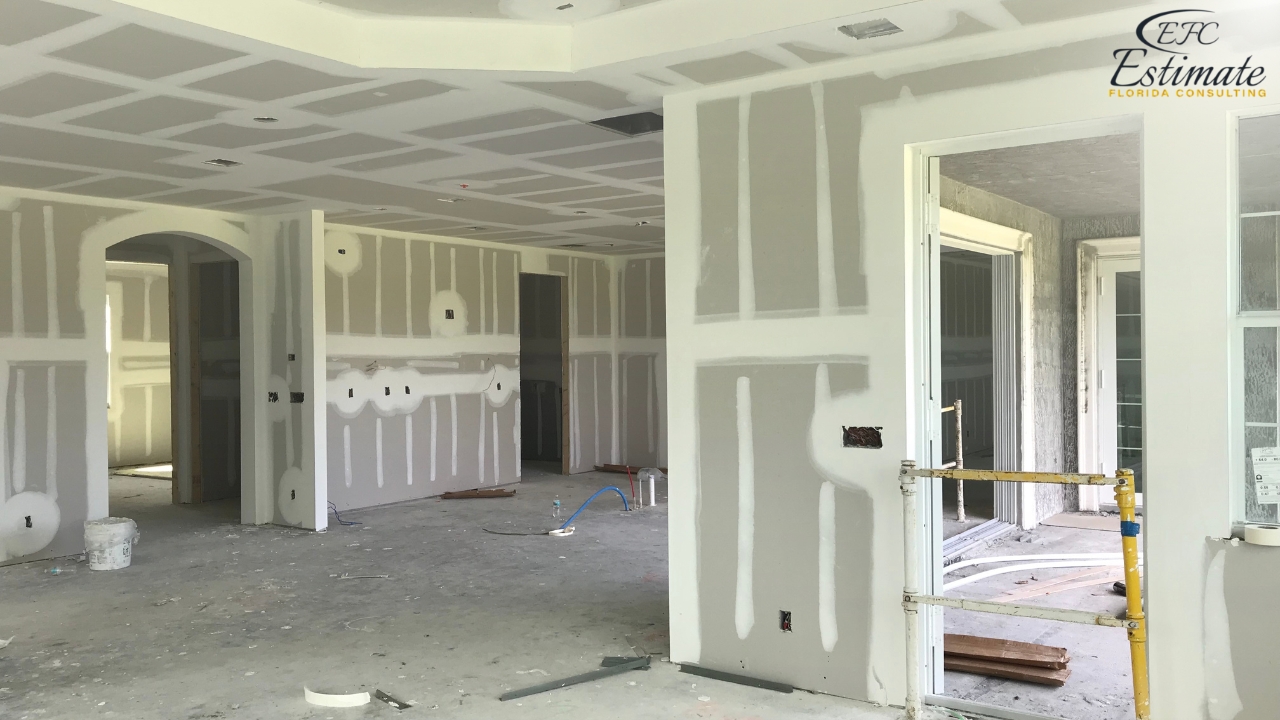
Labor Costs
Labor is a significant portion of drywall expenses, as skilled workers are essential for high-quality results. In Miramar, hourly rates range from $40 to $70, depending on the project’s size and complexity. Intricate designs, such as curved walls or custom finishes, may demand higher rates. Additionally, larger crews are often required for multi-story or commercial projects, further increasing labor costs.
Drywall Finishing Levels
Drywall finishing ranges from basic to high-end, with costs increasing for each level of detail:
- Level 0: No finishing; used for temporary installations.
- Level 1: Basic taping; suitable for hidden areas like utility rooms.
- Level 2: A light coat of compound; used in garages and unfinished spaces.
- Level 3: Prepares walls for textured finishes, often used in rentals.
- Level 4: A smooth surface, ready for standard paint or wallpaper.
- Level 5: The highest quality finish, ideal for glossy or accent walls.
Level 5 finishing, often 30% costlier than Level 4, requires multiple compound layers and a final skim coat for a flawless look.
Waste Disposal and Cleanup
Proper disposal of drywall scraps and site cleanup is critical. This adds $0.10 to $0.30 per square foot to the total cost. While often overlooked, ensuring compliance with environmental regulations and maintaining a clean worksite can save time and prevent fines. Contractors should budget for dumpsters and professional cleanup crews, especially for large-scale projects.
Residential vs. Commercial Drywall Installation Costs
- Residential Drywall Costs: Lower overall due to simpler layouts and smaller scale. However, custom finishes, specialty boards, and unique designs in high-end homes can raise costs.
- Commercial Drywall Costs: Higher due to the complexity of layouts, larger square footage, and the need for compliance with stringent building codes. Specialized materials like firewalls and acoustic panels further add to the expense.
Factors Affecting Drywall Costs in Miramar
The cost of drywall installation in Miramar is influenced by several critical factors that can vary based on the project’s scope, materials, and labor needs. Understanding these factors can help you plan your budget effectively and avoid unexpected expenses.
- Project Size: The size of the project is one of the most significant cost drivers. Larger projects benefit from economies of scale, meaning the cost per square foot tends to decrease as the size increases. For example, installing drywall in a single room will cost more per square foot compared to doing an entire house. This is because larger projects allow contractors to buy materials in bulk and complete tasks more efficiently, reducing the overall labor and material costs.
- Type of Drywall: The type of drywall you choose plays a vital role in determining the overall cost. While standard drywall is the most economical option, specialty drywall types such as soundproof, fire-resistant, or mold-resistant drywall can increase the price significantly. These specialized materials are often required for specific rooms, such as basements or bathrooms, where moisture or noise control is a concern. While these options are more expensive upfront, they can save money in the long term by reducing maintenance or enhancing the home’s functionality.
- Labor Availability: The availability of skilled labor in Miramar can also affect drywall costs. During busy construction seasons or after a hurricane or storm, when demand for contractors is high, labor costs can spike. This is particularly true if the project requires highly skilled workers for intricate designs or specialized installations. Planning your project during off-peak seasons might help you secure more competitive labor rates.
- Design Complexity: Projects with complex designs, such as curved walls, tray ceilings, or custom architectural features, require more expertise, time, and materials, which increases costs. Such designs not only involve more labor-intensive work but also demand additional planning and precision. For instance, curved walls often need specialized framing and custom-cut drywall, which can double the installation time compared to standard flat walls.
- Local Building Codes: Miramar has strict building codes designed to ensure structures can withstand hurricanes and other extreme weather events. These regulations often require higher-quality materials and additional inspections, both of which can increase the overall cost of drywall installation. Homeowners and businesses must ensure their projects comply with these codes to avoid fines or costly rework later.
Download Template For Drywall Project Breakdown
- Materials list updated to the zip code
- Fast delivery
- Data base of general contractors and sub-contractors
- Local estimators

Conclusion
Drywall installation is a vital part of construction and renovation projects in Aventura. Understanding the factors that influence costs, along with the types of drywall available, allows for better budgeting and decision-making. Whether you’re a contractor, homeowner, or developer, partnering with experts like Estimate Florida Consulting ensures accurate cost estimates and a seamless construction process.
Frequently Asked Question
The cost of drywall for 1000 sq ft depends on the type and quality of drywall chosen. Standard drywall sheets cost between $1.50 to $2.50 per square foot, including materials and installation. This brings the total cost to around $1,500 to $2,500, excluding additional costs like taping, mudding, and painting.
The cost of a drywall job typically ranges from $1.50 to $3.50 per square foot, depending on the project size, labor rates, and complexity. For a typical project, this includes hanging, taping, and finishing. Additional costs may apply for specialized drywall types or textured finishes.
To drywall a 1500 sq ft house, the cost generally ranges between $3,000 and $5,250, depending on the drywall quality, labor rates, and whether the price includes finishing. This estimate assumes basic 1/2-inch drywall and standard labor rates.
The cost to drywall a 12x12 room averages between $450 and $1,200, depending on the type of drywall and labor rates in your area. This cost includes hanging, mudding, taping, and finishing.
To estimate a drywall job:
- Measure the square footage of the walls and ceilings to be covered.
- Divide the total square footage by 32 or 48 to determine the number of sheets needed (standard drywall sheets are 4x8 or 4x12 feet).
- Include costs for materials like screws, tape, and joint compound.
- Add labor costs, typically $1.00 to $2.00 per square foot.
- Factor in additional costs for special finishes, corners, and cleanup.
For a 2000 sq ft house, you will need approximately 8,000 to 10,000 sq ft of drywall. This estimate includes walls and ceilings and assumes 4 to 5 times the square footage of the floor space.
For a 1500 sq ft house, you’ll need approximately 110 to 140 sheets of drywall, assuming 4x8 sheets are used. This estimate factors in walls and ceilings and some waste.
The general rule of thumb for drywall estimating is to calculate 4 to 5 times the floor square footage to determine the required drywall square footage. Add an extra 10% for waste and mistakes.
Comprehensive Trade-Specific Estimates
At Estimate Florida Consulting, we offer detailed cost estimates across all major trades, ensuring no part of your project is overlooked. From the foundation to the finishing touches, our trade-specific estimates provide you with a complete and accurate breakdown of costs for any type of construction project.

Testimonials
What Our Clients Say
We take pride in delivering accurate, timely, and reliable estimates that help contractors and builders win more projects. Our clients consistently praise our attention to detail, fast turnaround times, and the positive impact our estimates have on their businesses.
Estimate Florida Consulting has helped us win more bids with their fast and accurate estimates. We trust them for every project!

Steps to Follow
Our Simple Process to Get Your Estimate
01
Upload Plans
Submit your project plans, blueprints, or relevant documents through our online form or via email.
02
Receive Quotation
We’ll review your project details and send you a quote based on your scope and requirements.
03
Confirmation
Confirm the details and finalize any adjustments to ensure the estimate meets your project needs.
04
Get Estimate
Receive your detailed, trade-specific estimate within 1-2 business days, ready for your project execution.





